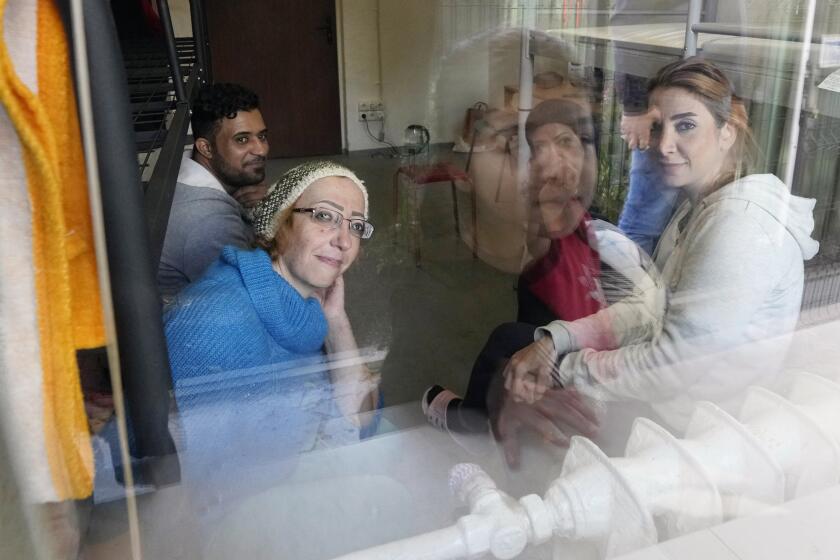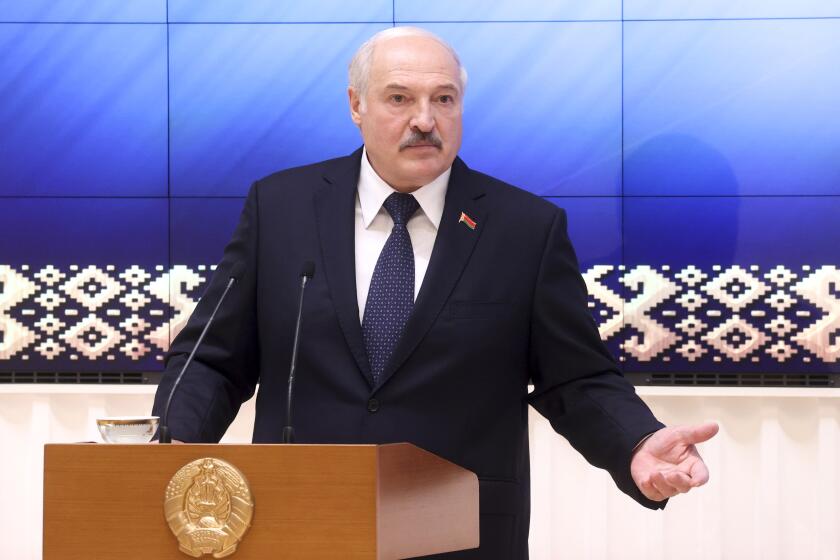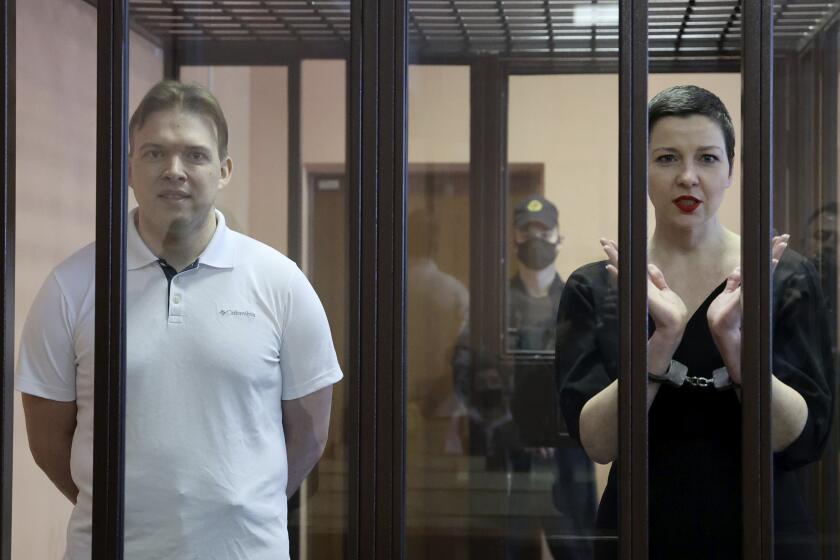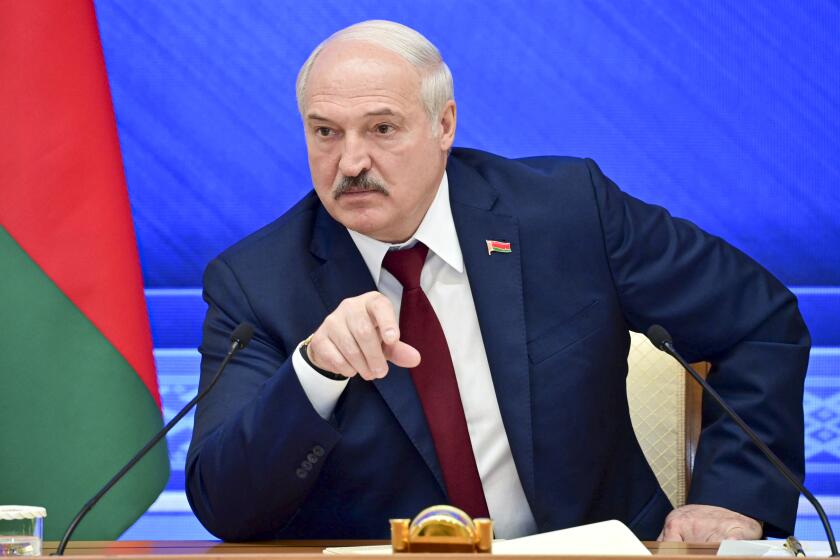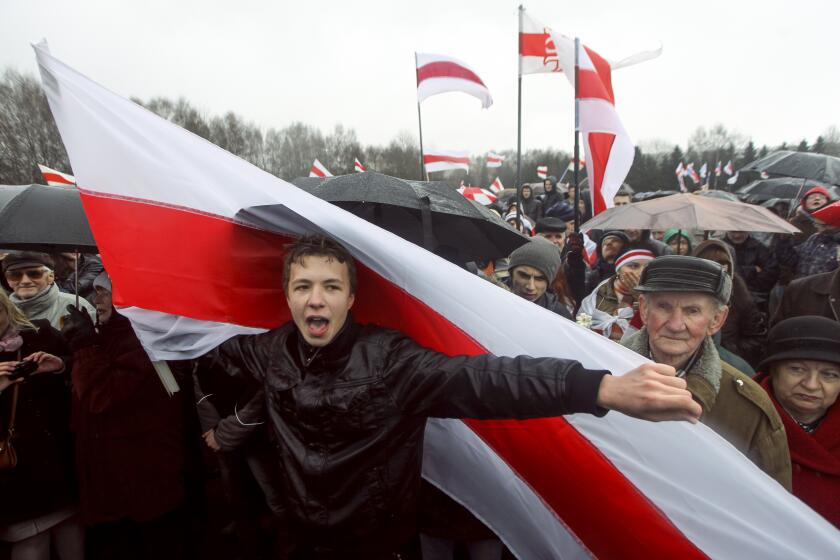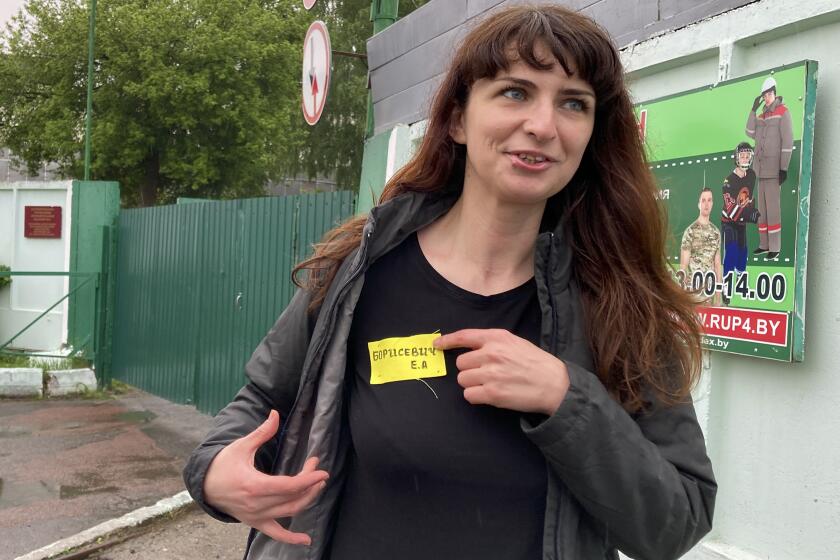Migrants camp out at Polish border amid tense standoff between EU and Belarus
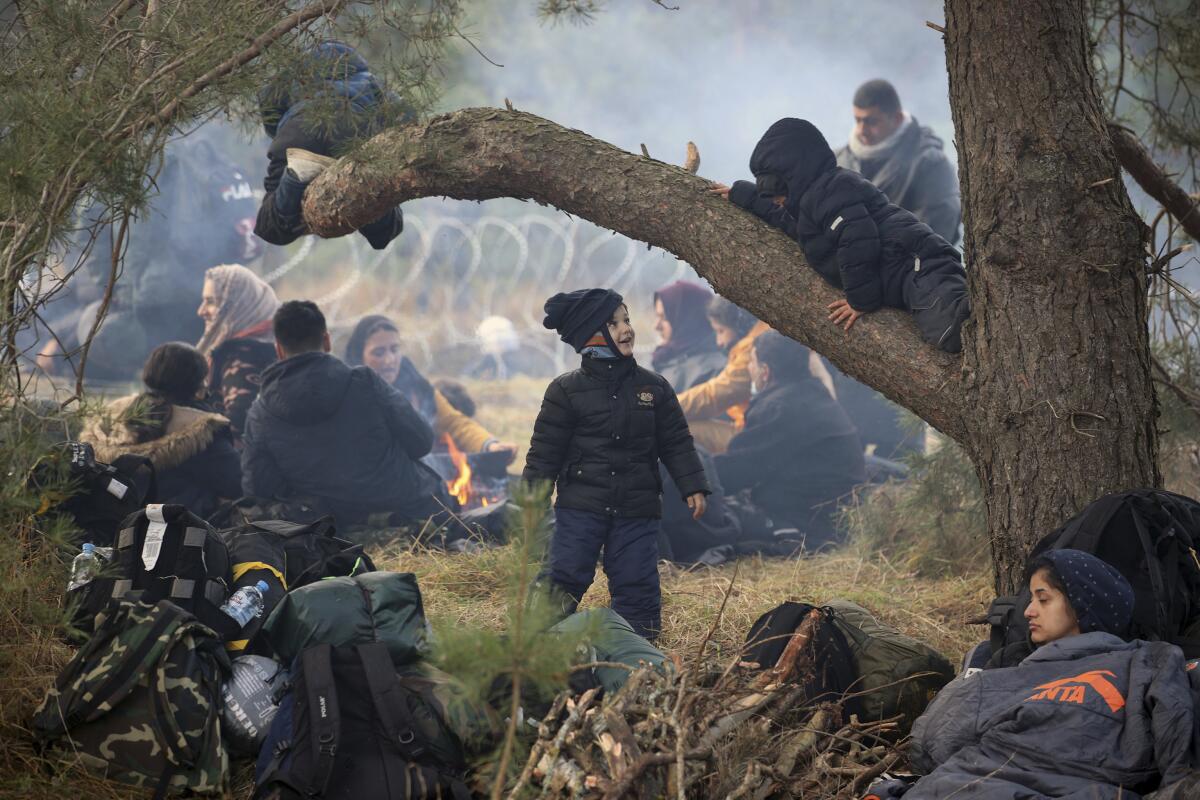
WARSAW â Polish riot police reinforced Polandâs eastern border Tuesday, a day after hundreds of migrants tried to storm across the razor-wire border fence from Belarus. Thousands of migrants still remained on the Belarusian side, and Polish authorities feared the tense standoff could escalate.
Polish authorities reported that the situation on the border â which is also the eastern border for the 27-nation European Union and NATO â was calm overnight and early Tuesday, but authorities said they were bracing for any possibility of unrest. Polandâs Defense Ministry said Tuesday that a large group of Belarusian forces was moving toward the migrant camp.
Polish Maj. Katarzyna Zdanowicz, from the regionâs border guards, estimated there to be 3,000 to 4,000 migrants along the border, including about 800 in the vicinity of the large makeshift migrant camp. She also said there was a greater concentration of Belarusian service personnel on the border to âcontrol, steer and direct these people.â
She said the Polish assessment came from aerial observations, and alleged that Belarus authorities were taking local journalists to the border area to present the situation to the people of Belarus as propaganda.
There was no way to independently verify what was happening. Journalists have limited ability to operate in Belarus, and a state of emergency in Poland has kept reporters and others out of the border area.
A day earlier, tensions flared as a large group of migrants sought to illegally push their way into Poland, according to video posted on social media by Polish authorities.
People hoping to reach Europe from war-torn lands are finding themselves pawns in an escalating dispute between Belarus and the European Union.
Polish forces repelled them, and the migrants settled into a camp overnight, with tents and campfires along the border, in near-freezing temperatures.
Mondayâs siege escalated a crisis that has been simmering for months, in which the authoritarian regime of Belarusian President Alexander Lukashenko has encouraged migrants to illegally enter the EU.
The EU reacted Tuesday by tightening visa rules for Belarus officials over what it is calling a âhybrid attackâ against the 27-country bloc.
EU headquarters said it was âpartially suspendingâ an agreement with Belarus that eases visa rules.
Belarusâ authoritarian president says heâs prepared to invite Russian troops into the country, if necessary, to ensure security of both countries.
The move affects Belarusian members of the government, lawmakers, diplomats and top court representatives. It requires travelers to provide extra documents and pay more for visas.
In videos posted on Twitter, tents and campfires can be seen as the Polish police play an announcement warning the migrants that entering Poland is allowed only at official border crossings, where visas are required.
But as of early Tuesday, the nearest crossing point, in Kuznica, in the northeast of the country, was closed.
The United Nations refugee agencies UNHCR and the International Organization for Migration called the situation âalarming.â They said they have been in contact with both the Polish and Belarusian governments and urged them to ensure that the large group in the makeshift camp received humanitarian assistance.
A court in Belarus sentences two opposition activists to lengthy prison terms, the latest move in the governmentâs relentless crackdown on dissent.
The situation marks an escalation in months of migration pressure on Lithuania, Poland and, to a lesser extent, Latvia, the three EU states on the blocâs eastern border with Belarus. The EU says Belarus is building the pressure, intending to destabilize the bloc in retaliation for Western sanctions.
Thousands of migrants have sought to illegally enter Poland, and have often ended up stuck in a forested area of swamps and bogs, pushed back and forth between Belarusian and Polish forces.
One man who lives in Bialowieza, a Polish village in the restricted area, told the Associated Press that he has met many migrants who are often thirsty, hungry and in need of boots or medical care. He is among local volunteers providing food and other aid to the migrants and spoke on condition of anonymity because Polish authorities discourage such help.
âThey are in really bad condition, and the situation is getting worseâ as temperatures drop, he said.
Belarus says it has rescinded its permission for the U.S. ambassadorâs appointment and told the U.S. to cut its embassy staff in retaliation for Washingtonâs sanctions.
He said some of the migrants were not aware of where they were, believing themselves already in Germany, and appeared to have been âvery disinformed by Belarusian soldiers and guards.â He said some were looking for taxis, unaware that no taxis are allowed in the closed zone. So far, at least eight migrants have reportedly died in the difficult crossing.
Polish Prime Minister Mateusz Morawiecki, accompanied by Defense Minister Mariusz Blaszczak, went to the border Tuesday morning to meet with border guards and other security officials. Morawiecki praised them, also on behalf of the EU, for their âeffective defense of our border.â
âWe do not know what else Lukashenkoâs regime will come up with â this is the reality,â Morawiecki said.
Meanwhile, the Lithuanian government Tuesday asked Parliament to declare a state of emergency along the border with Belarus for a month, starting at midnight.
Breaking News
Get breaking news, investigations, analysis and more signature journalism from the Los Angeles Times in your inbox.
You may occasionally receive promotional content from the Los Angeles Times.
The state of emergency would be in place along the border in a three-mile-wide strip, as well as in migrant accommodation facilities in Vilnius, the capital, and elsewhere in the country.
The measure would include restricting the right of irregular migrants accommodated in Lithuania to communicate in writing or by phone except to contact the countryâs authorities.
The migrants are mostly people from the Mideast and Africa who have seized on the opening of a new migration route to enter Europe, often seeking to reach family members who have already immigrated to Germany or other countries in Western Europe.
Poland has received strong signals of support and solidarity from the EU, fellow EU countries and the United States as it deals with its border crisis.
Roman Protasevich long feared that Belarusian authorities would try to abduct him, even though he had fled the country. They arrested him Sunday.
Germanyâs outgoing interior minister, Horst Seehofer, said Tuesday that all EU countries âmust stand together, because Lukashenko is using peopleâs fates with the support of Russian President Vladimir Putin to destabilize the West.â He called for the European Commission to support Poland in securing the border.
âThe Poles are fulfilling a very important service for the whole of Europe,â he said.
So far, Polandâs ruling nationalists have refused help from Frontex, the EUâs border agency.
Many of the migrants fly to Minsk, the capital of Belarus, on tourist visas, and from there travel by taxi to the border with Poland. The EU is seeking to pressure airlines not to facilitate the travel.
Human rights activists say Belarus is sewing yellow tags on political prisonersâ clothes to single them out, in a move with echoes of Nazi Germany.
Although direct flights from Iraq to Minsk were suspended in August, migrants have been flying into Belarus via commercial and chartered flights from Syria, Turkey, the United Arab Emirates and even Russia, according to recent internal EU migration reports seen by the Associated Press.
On social media, smugglers have advertised transportation from Belarus to Germany by car. Drivers smuggling people across the Polish-German border were mainly from non-EU countries, according to the reports, although there were also EU nationals involved.
Many of the migrants have ended up in Germany. But some continued their journey all the way to Finland by ferry via Sweden, one report said.
More to Read
Sign up for Essential California
The most important California stories and recommendations in your inbox every morning.
You may occasionally receive promotional content from the Los Angeles Times.
